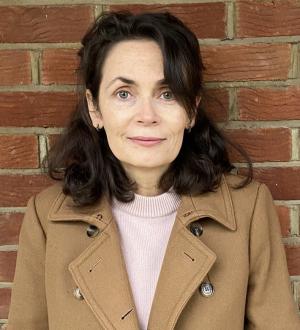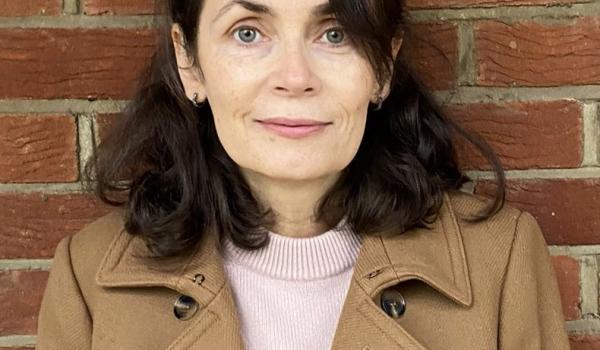I'd been experiencing several symptoms for about 12-18 months before my diagnosis. Both lower back pain and pain in my side, along with extreme fatigue – but I had a busy life raising two teenage boys and just put a lot of it down to stress, as did the GP at first. That, and I was now in my early 50s and thought any changes I felt were most likely because of the menopause.
However, the fatigue continued to worsen. It got to the point where I'd look at the cold, tiled surface in my kitchen when I was cooking dinner for my family and think, ‘I could just lie down and sleep right there’. It was really starting to really have an impact on my day-to-day life.

After doing a bit of research, I thought my symptoms might be due to a condition like ME (myalgic encephalomyelitis). Again, I spoke to my GP who ordered a blood test which showed that I was mildly anaemic. I was prescribed iron tablets, but my symptoms continued, and I started to develop new ones.
I began experiencing heavy discharge regularly, which had an odour. I mentioned this to my GP as well and it was put down to the menopause. I was still having periods, although intermittently, and they were extremely heavy. It didn’t feel like anybody was looking at my symptoms all together – nobody thought to link them.
Eventually, due to the consistent heavy periods, and a prolapsed uterus that had been diagnosed previously, I was sent for an internal scan to check for polyps and fibroids.
A winding path to my diagnosis
In March 2020 it was confirmed that they had found a fibroid and a procedure was scheduled to remove it. Unfortunately, this coincided with the start of the Covid-19 pandemic in the UK. Due to the lockdown and new covid regulations the procedure kept getting pushed back.
Months went by, and in October 2020 it still hadn’t happened. Before I had a new confirmed date, I was invited to a routine renal scan that I have annually due to a family history of kidney cancer.
It was during this scan that they found a growth next to my fallopian tube almost 8cm in length. My fibroid removal was cancelled and I was immediately sent for more tests – but after a CT and an MRI the doctor still couldn’t confirm whether the growth was cancerous or not.
A few weeks later, in the December, I had an appointment with a gynaecologist that recommended a radical hysterectomy. There was still no real mention of cancer, but I agreed to the surgery as the best course of action. From there it all happened very quickly.
The operation was scheduled for 7 January 2021. I remember filling in the consent form and seeing that it mentioned follow up treatment, but as someone who tends to see the best in a situation rather than the worst, I still wasn’t thinking that it was anything more serious. The ‘c word’ as I called it wasn’t at the forefront of my mind.
When I came round from surgery I was told that it had all gone well. I was home in a couple of days and requested that my follow up appointment be done over the phone as covid was still a concern and I didn’t want to put myself in any unnecessary danger.
However, that phone call changed everything.
That was when they confirmed that the growth that had shown up on my scans, was a stage two high grade serous tumour – the diagnosis was ovarian cancer.
The choice to complete chemotherapy
I met with my oncologist a few days later to discuss next steps. The positive was that there was no real evidence of the cancer spreading and she believed that all signs of it had been removed during my surgery.
Saying that, she still recommended that I complete a course of chemotherapy. A ‘belts and braces approach’ to capture anything that potentially was too small to be picked up during surgery, and to combat any recurrence.
My first shock was the diagnosis, my second was that I needed chemotherapy to help prevent the cancer from returning.
It was made clear that it was my decision and initially I was torn. I asked the oncologist what she would do and she didn’t even have to think about it, ‘I would have the chemotherapy’.
After talking it through with my husband I decided, reluctantly, to go ahead with it. It might not happen – the cancer might never return, I might be fine, but I didn’t want to risk that one day I could regret not having had the treatment.
In total I had five out of the six chemotherapy sessions on offer, four double with carboplatin and paclitaxel and a single carboplatin one, before stopping.
I did experience most of the side effects that I was worried about, including losing my hair and my physical strength, but I was confident in my decision. Medical advice buys you the best chance and I had trusted it.
Finding Target Ovarian Cancer
I definitely had symptoms of ovarian cancer that were missed. Not through carelessness, but they were. We need to make sure these signs aren’t just written off as menopause and/or stress. I want to help women feel comfortable and confident enough to trust their bodies and push for the tests that they may need.
I knew nothing about ovarian cancer before my diagnosis. There's a lot more information about cancer out there now, but still, it wasn’t one that I had seen or heard anything about.
That's why so much more needs to be done to improve awareness. When I was diagnosed I did turn to google, but it quite quickly became overwhelming. That’s when I found Target Ovarian Cancer.
I signed up to receive emails from the charity to get more information and thought about attending the Tea and Chat sessions which are held over Zoom fortnightly, but it just wasn’t the right time for me. I was still trying to come to terms with what had happened and wasn’t in a place where I felt comfortable talking about what I was going through.
Adapting to a new you post treatment
It was a euphoric moment finishing treatment. Similarly, when you get to your first blood appointment and everything's clear – more good news.
I hadn’t told everyone I knew about my diagnosis so I did feel a bit freer in certain conversations, not having to constantly talk about how I was getting on etc. But not talking about it didn’t detract from the impact that it has. That stays with you for a long time after treatment is over.
For almost a year, although I was relieved to no longer need treatment, I felt that I was still living in the shadow of it all. Especially after learning that I'm a carrier for the BRCA gene mutation.
I had to go on both a physical and psychological journey to adapt to a new world where cancer was a part of my life experience, but I was ok. I couldn’t keep it in a box anymore and not talk about it, but I also didn’t want to be defined by it.
Even using the word ‘cancer’ was part of my healing process. For over a year, I did everything I could to avoid saying it, I didn’t want to, but I realised not doing so didn’t mean it hadn’t happened. I needed to acknowledge what had happened in order to minimise its power over me and move on.
Although I have a close network of family and friends that have supported me throughout, I felt like I needed something else as well. That’s when I reached out to a local charity My Cancer My Choices. They helped me physically with acupuncture, and mentally with a mindfulness course.
The latter was really beneficial for me, helping to deal with all the worries and fears of ‘Had my treatment really worked?’ ‘How long for?” As well as helping me just live in the moment more and taking absolutely nothing for granted.
For anyone coming out of treatment now I would say, just be kind to yourself. It’s a huge period of adjustment and you’ll still need support from the networks you have around you.
Looking to the future by talking about my past
Having gone through that period and feeling like I’m now on the other side of it, I firmly believe that I need to do all I can to alert women to the signs and symptoms of this disease and support those that I can who are currently amid their own journey.
When you’re in it, it can feel like it’s never ending. Like it will last forever.
I know I found some comfort in watching videos of others and hearing their stories – seeing someone a year on after a good outcome and thinking ‘I can get there’.
If sharing my story can help just one person, then it’s worth it. To show someone that a diagnosis can be the beginning of a new chapter. It looks and feels a bit different but you’re still you – just a slightly different version.
To any woman who thinks that they might be experiencing symptoms, or just feels that something isn’t right, please go to your GP. Don’t just dismiss them as something else. It might be nothing, but it’s better to know and have all the information.
If you’ve been affected by this story and would like to speak to a specialist nurse, you can call our dedicated support line on 020 7923 5475 or contact us: [email protected]. We're open from 9am until 5pm, Monday to Friday.
If reading this story has helped you, join the Ovarian Cancer Community to connect with more people affected by ovarian cancer: www.targetovariancancer.org.uk/onlinecommunity



